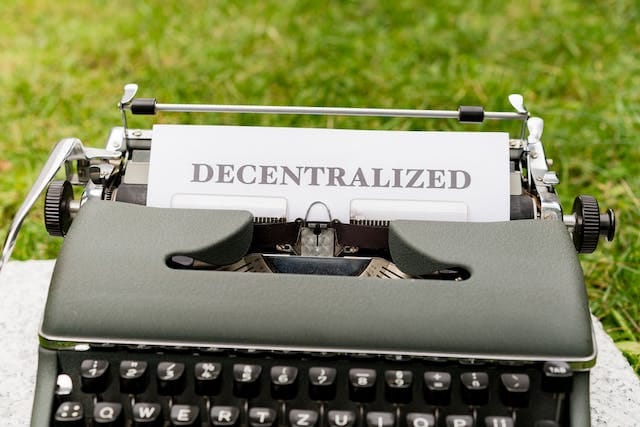Decentralized Finance (DeFi): A Simple Guide
Demystify Decentralized Finance (DeFi) with this simple guide. Explore the world of DeFi, understanding its concepts and potential, empowering you to navigate this innovative financial landscape confidently

Understanding DeFi: The Future of Finance
In a world where technology rapidly evolves, a new player has emerged in the financial sector: Decentralized Finance, commonly known as DeFi. This concept might sound complex, but it's actually quite straightforward. Let's break it down in simple terms.
What is DeFi?

DeFi, short for Decentralized Finance, is an innovative approach to financial services, diverging from traditional, centralized systems. Instead of relying on banks or credit unions, DeFi utilizes blockchain technology, predominantly on networks like Ethereum, to operate. This digital transformation enables a decentralized structure, meaning no single authority, like a government or financial institution, controls it.
DeFi offers a suite of financial services — from lending, borrowing, to asset trading — all managed through smart contracts. These are automated, self-executing contracts with terms directly written into code, ensuring security, transparency, and efficiency. Essentially, DeFi creates an inclusive, open-access financial ecosystem online, breaking down barriers typically associated with conventional finance. By leveraging blockchain, it ensures transactions are secure, transparent, and immutable, appealing to a global audience seeking alternative financial solutions. This democratization of finance represents a significant shift, promoting financial inclusion and innovation.
How Does DeFi Work?
DeFi, standing for Decentralized Finance, revolutionizes traditional financial models by leveraging blockchain technology and smart contracts. Smart contracts are the cornerstone of DeFi, acting as automated, self-executing contracts with coded terms. This innovation operates on blockchain networks, such as Ethereum, ensuring unparalleled security and transparency.
The blockchain foundation of DeFi is critical. It's a decentralized ledger that records all transactions across a network of computers. This decentralization means no single entity controls the data, making DeFi services resistant to censorship and less prone to centralized control. Furthermore, blockchain's inherent transparency allows all network participants to view transaction histories, fostering trust and openness.
DeFi's operation is global, transcending borders and offering financial services to anyone with internet access. This accessibility challenges traditional finance's barriers, like geographic restrictions and the need for intermediaries like banks. DeFi includes a range of financial activities — lending, borrowing, trading, investment, and asset management — all executed on decentralized platforms without the need for centralized institutions.
By combining blockchain, smart contracts, and decentralized protocols, DeFi provides a more accessible, transparent, and inclusive financial system. This system is pivotal in advancing financial democratization, reducing reliance on traditional banking infrastructures, and introducing an era of financial self-sovereignty.
Key Advantages of DeFi

DeFi, or Decentralized Finance, offers a transformative approach to accessing financial services, with several key advantages over traditional banking systems:
Accessibility: DeFi eliminates geographical and socio-economic barriers, enabling global access to financial services with just an internet connection. This feature is particularly empowering for unbanked or underbanked populations, who may lack access to conventional banking facilities. DeFi platforms facilitate a range of services, including lending, borrowing, and trading, without the need for a traditional bank account or credit history.
Autonomy: In the DeFi ecosystem, users have complete control over their assets, marking a significant shift from the dependency on centralized financial institutions. This autonomy is enabled by blockchain technology, which allows users to engage directly with financial markets and products without intermediaries. This user-centric approach enhances personal financial sovereignty and reduces the risks associated with centralized control, such as bank failures or unilateral account freezes.
Transparency: One of the most compelling aspects of DeFi is the inherent transparency of blockchain technology. Every transaction on a blockchain is recorded on a public ledger, accessible to anyone. This level of transparency ensures fairness and trust in the financial system. It also provides auditability and real-time verification of transactions, which is a stark contrast to the often opaque operations of traditional financial institutions.
These advantages position DeFi as a groundbreaking alternative to traditional finance, offering a more inclusive, empowering, and transparent financial landscape. By leveraging blockchain technology, DeFi is not just a technological innovation; it's a socio-economic leap forward, democratizing access to financial services and giving users unprecedented control over their financial destinies.
DeFi Services: What's on Offer?
DeFi, or Decentralized Finance, presents an array of innovative services that are reshaping the financial landscape. These services, facilitated by blockchain technology, offer more autonomy and flexibility compared to traditional finance. Key offerings in the DeFi space include:
1. Lending and Borrowing: DeFi platforms revolutionize the lending and borrowing sphere. Users can lend their digital assets to others and earn interest, or borrow by providing collateral, all without a traditional bank's involvement. This peer-to-peer lending system is efficient, transparent, and often offers competitive interest rates compared to conventional banking.
2. Asset Trading: DeFi extends beyond basic cryptocurrency exchanges. It supports a broader range of asset trading, including tokenized versions of real-world assets, derivatives, and synthetic assets. This trading occurs on decentralized exchanges (DEXs) where users trade directly from their wallets, ensuring higher security and reduced counterparty risk.
3. Savings Accounts: In the DeFi ecosystem, users can deposit their digital assets into savings accounts to earn interest. These interest rates often surpass those of traditional banks, making them an attractive option for earning passive income. This is achieved through various protocols that optimize the interest rates based on supply and demand in the DeFi market.
Additionally, DeFi includes other innovative services like yield farming, where users earn rewards for providing liquidity, insurance services for digital assets, and decentralized autonomous organizations (DAOs) for collective investment and governance.
The DeFi ecosystem is constantly evolving, introducing new financial products and services that cater to a wide range of needs. Its growth reflects a shift towards a more open, inclusive, and flexible financial system, where users have greater control and more options to manage and grow their wealth.
Risks and Considerations

DeFi, though offering revolutionary financial services, carries inherent risks and considerations that users should be mindful of:
1. Security Risks: Being at the forefront of financial technology, DeFi is a prime target for cyber-attacks and security breaches. The technology, primarily based on smart contracts, is still in its developmental stage. As such, it can have vulnerabilities that hackers exploit. Users need to be cautious about the platforms they choose and stay informed about security practices.
2. Volatility: The DeFi ecosystem largely depends on cryptocurrencies, which are known for their high volatility. This market unpredictability can lead to significant financial gains, but equally, substantial losses. Users engaging in DeFi need to be prepared for the turbulent nature of crypto assets, which can be influenced by various external factors including market sentiment, regulatory news, and technological developments.
3. Regulatory Uncertainty: DeFi operates in a relatively new and rapidly evolving domain that lacks clear regulatory frameworks. This uncertainty poses risks regarding compliance and legal status across different jurisdictions. As governments and financial authorities start to pay closer attention, there could be sudden regulatory changes impacting DeFi operations and asset valuations.
4. Liquidity Risks: Some DeFi platforms may face liquidity issues, making it difficult for users to withdraw their funds promptly. This risk is particularly prevalent in smaller, less established DeFi projects or during market downturns.
5. Smart Contract Risks: The code in smart contracts is immutable once deployed on the blockchain. If there are bugs or errors in the code, they can lead to loss of funds and are often unrectifiable.
Understanding these risks is crucial for anyone looking to engage with DeFi. It's important to conduct thorough research, understand the specifics of each DeFi service, and approach investments with caution. While DeFi offers significant opportunities for innovation and financial growth, it also necessitates a higher degree of responsibility and awareness from its users.
Conclusion: The Future of Finance
DeFi, or Decentralized Finance, is forging a new path in the financial world, signaling a paradigm shift towards a system that is more open, accessible, and transparent. This emerging sector offers a compelling alternative to traditional banking systems, particularly for Americans seeking greater control over their financial transactions and fewer bureaucratic obstacles. DeFi's growth heralds a future where financial empowerment and inclusivity are at the forefront, breaking down longstanding barriers and democratizing access to financial services.
However, navigating this new terrain requires diligence. Users must understand the inherent risks and continually educate themselves to make informed decisions. DeFi, with its innovative use of blockchain technology and smart contracts, is redefining our relationship with money and financial services. As it evolves, it promises to bring forth a plethora of opportunities and innovations, potentially benefiting a wide range of individuals and industries. In essence, DeFi isn't just a fleeting trend; it's poised to become a significant, enduring fixture in the landscape of global finance.




